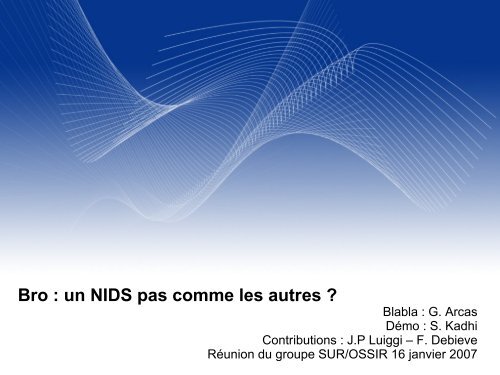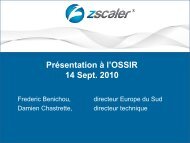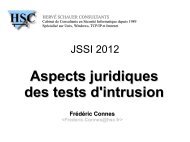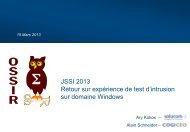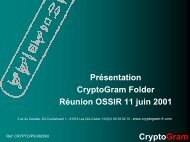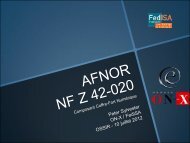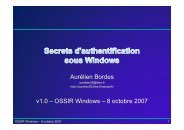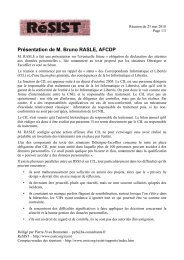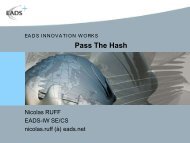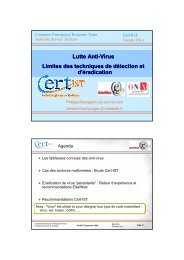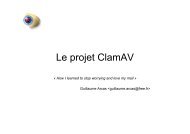Bro : un NIDS pas comme les autres ? - OSSIR
Bro : un NIDS pas comme les autres ? - OSSIR
Bro : un NIDS pas comme les autres ? - OSSIR
You also want an ePaper? Increase the reach of your titles
YUMPU automatically turns print PDFs into web optimized ePapers that Google loves.
<strong>Bro</strong> : <strong>un</strong> <strong>NIDS</strong> <strong>pas</strong> <strong>comme</strong> <strong>les</strong> <strong>autres</strong> <br />
Blabla : G. Arcas<br />
Démo : S. Kadhi<br />
Contributions : J.P Luiggi – F. Debieve<br />
Ré<strong>un</strong>ion du groupe SUR/<strong>OSSIR</strong> 16 janvier 2007
Présentation du projet <strong>Bro</strong><br />
<strong>Bro</strong> c'est :<br />
YALB<strong>NIDS</strong> (Yet Another Libpcap Based <strong>NIDS</strong>)<br />
Destiné à la détection sur des réseaux Gbps à fort trafic.<br />
Projet lancé en 1998 par Vern Paxson (ICIR/ICSI/LBNL)<br />
http://bro-ids.org<br />
Conçu pour :<br />
Minimiser sinon éviter toute perte de paquet<br />
Minimiser sinon éviter tout faux-positif<br />
Résister aux attaques dirigées contre la sonde<br />
Permettre <strong>un</strong>e remontée d'alerte en temps réel<br />
Accepter facilement l'ajout de nouvel<strong>les</strong> fonctionnalités<br />
Fonctionnel mais encore expérimental.<br />
Version Développement : 1.2.1 (octobre 2006)<br />
Version stable : 1.1d<br />
2
Vern Paxson<br />
1998<br />
<strong>Bro</strong>: A System for Detecting Network Intruders in Real-Time.<br />
1999<br />
Known TCP Implementation Problems, RFC 2525<br />
TCP Congestion Control, RFC 2581<br />
2000 - 2001<br />
Detecting Backdoors, Detecting Stepping Stones<br />
Network Intrusion Detection: Evasion, Traffic Normalization, and Endto-End<br />
Protocol Semantics<br />
scrub (nettoyage du trafic dans PF/*BSD)<br />
2002 - 2006<br />
How to 0wn the Internet in Your Spare Time, A Taxonomy of Computer<br />
Worms, Inside the Slammer Worm, The Spread of the<br />
Sapphire/Slammer Worm, The Top Speed of Flash Worms, Very Fast<br />
Containment of Scanning Worms, A Worst-Case Worm<br />
Dynamic Application-Layer Protocol Analysis for Network Intrusion<br />
Detection<br />
Maitrise donc le sujet ! :-)<br />
3
Caractéristiques<br />
Trois grandes famil<strong>les</strong> de <strong>NIDS</strong> :<br />
Détection par signatures<br />
Une signature décrit <strong>les</strong> caractéristiques d'<strong>un</strong> paquet ou<br />
d'<strong>un</strong> évènement jugé suspect ou malicieux<br />
Exemple (et standard de facto) : Snort<br />
Détection par recherche d'anomalies<br />
A partir d'<strong>un</strong> historique des activités réseau, on construit <strong>un</strong><br />
profil type. Tout écart par rapport à ce profil est suspect.<br />
Pas d'exemple véritablement opérationnel (SPADE/Snort)<br />
Détection des violations de politiques de sécurité<br />
Qui a le droit de faire quoi, quand, <strong>comme</strong>nt, etc Quel<strong>les</strong><br />
sont <strong>les</strong> actions prohibées <br />
<strong>Bro</strong><br />
4
Architecture <strong>Bro</strong> 1.1<br />
5
Architecture <strong>Bro</strong> 1.2<br />
6
Libpcap<br />
Utilisée pour capturer et filtrer le trafic réseau.<br />
<strong>Bro</strong> Version: 1.2.1 (Fichier logs/info*)<br />
Capture filter: ((((((((((((((((((((((udp port 69) or<br />
(port ftp)) or (port 143)) or (tcp dst port 80 or tcp<br />
dst port 8080 or tcp dst port 8000)) or (tcp port 80 or<br />
tcp port 8080 or tcp port 8000 or tcp port 8001)) or<br />
(port 111)) or (tcp[13] & 7 != 0)) or (tcp src port 80<br />
or tcp src port 8080 or tcp src port 8000)) or (port<br />
6666)) or (port smtp)) or (icmp)) or (port 53)) or (port<br />
111)) or ((ip[6:2] & 0x3fff != 0) and tcp)) or (port<br />
6667)) or (port ftp)) or (port 512 or port 513 or port<br />
515)) or (port telnet)) or (port smtp)) or (port 161 or<br />
port 162)) or (tcp[2:2] > 32770 and tcp[2:2] < 32901 and<br />
tcp[0:2] != 80 and tcp[0:2] != 22 and tcp[0:2] != 139))<br />
or (port telnet or tcp port 513)) or (dst port 135 or<br />
dst port 137 or dst port 139 or dst port 445)<br />
Comme tout utilitaire basé sur la libpcap, <strong>Bro</strong> peut relire <strong>un</strong><br />
trafic capturé dans ce format.<br />
7
Langage <strong>Bro</strong><br />
Langage orienté Réseau, proche du C, exemple tftp.bro :<br />
@load notice<br />
redef enum Notice += { Outbo<strong>un</strong>dTFTP, };<br />
redef capture_filters += { ["tftp"] = "udp port<br />
69" };<br />
@load udp-common<br />
@load site<br />
global tftp_notice_co<strong>un</strong>t: table[addr] of co<strong>un</strong>t<br />
&default = 0 &read_expire = 7 days;<br />
event udp_request(u: connection)<br />
{ if ( u$id$resp_p == 69/udp && u$id$orig_p >=<br />
1024/udp )<br />
{<br />
local src = u$id$orig_h;<br />
local dst = u$id$resp_h;<br />
if ( is_local_addr(src) && ! is_local_addr(dst) &&<br />
++tftp_notice_co<strong>un</strong>t[src] == 1 )<br />
NOTICE([$note=Outbo<strong>un</strong>dTFTP, $conn=u,<br />
$msg=fmt("outbo<strong>un</strong>d TFTP: %s -> %s", src, dst)]);}<br />
}<br />
8
Event Engine<br />
Contrôle l'intégrité des paquets (en-têtes IP, etc), émet<br />
des alertes en cas d'anomalie et réassemblage des<br />
paquets fragmentés si nécessaire<br />
Si <strong>les</strong> tests d'intégrité sont corrects, <strong>les</strong> paquets sont<br />
inspectés dans leur contexte Session<br />
IP source, IP destination, protocole, ports sources/destination<br />
TCP<br />
Contrô<strong>les</strong> d'intégrité en-têtes et payload<br />
Suivi de l'état (TCP flags) et mise à jour des tab<strong>les</strong> de<br />
sessions<br />
connection_attempt, connection_established,<br />
connection_rejected, connection_finished<br />
UDP<br />
udp_request, udp_reply<br />
9
Policy Script Interpreter<br />
Dernier étage de la fusée<br />
Traite <strong>les</strong> évènements (données en sortie de l'Event<br />
Engine) et applique <strong>les</strong> politiques décrites dans <strong>les</strong> scripts<br />
<strong>Bro</strong>.<br />
Ces scripts sont écrits dans le langage <strong>Bro</strong>.<br />
Note : le langage <strong>Bro</strong> est également utilisé pour<br />
programmer des tâches d'administration internes <strong>comme</strong> la<br />
gestion des fichiers de log, notamment leur rotation.<br />
10
Snort signatures not dead !<br />
<strong>Bro</strong> détecte <strong>les</strong> intrusions sur la base de politiques mais il<br />
est aussi possible d'intégrer <strong>les</strong> (bonnes vieil<strong>les</strong>)<br />
signatures Snort ou d'écrire <strong>les</strong> siennes.<br />
Exemple de signature <strong>Bro</strong> :<br />
signature sid-1327 {<br />
ip-proto == tcp<br />
src-ip != local_nets<br />
dst-ip == local_nets<br />
dst-port == 22<br />
event "EXPLOIT ssh CRC32 overflow"<br />
tcp-state established,originator<br />
payload /\x00\x01\x57\x00\x00\x00\x18/<br />
payload /.{7}\xFF\xFF\xFF\xFF\x00\x00/<br />
}<br />
11
Dynamic Protocol Detection<br />
Introduit dans la version 1.2 de <strong>Bro</strong><br />
Objectif : ne plus baser l'analyse protocolaire sur <strong>les</strong> seuls<br />
ports destination.<br />
Exemple (classique) : SSH sur port tcp/443<br />
Activation :<br />
brolite.bro :<br />
## Dynamic Protocol Detection configuration<br />
const use_dpd = T;<br />
Le fichier dpd.sig contient <strong>les</strong> signatures des protoco<strong>les</strong><br />
supportés. Exemple :<br />
signature dpd_ssh_server {<br />
ip-proto == tcp<br />
payload /^[sS][sS][hH]-/<br />
tcp-state responder<br />
}<br />
12
Installation<br />
Physique :<br />
Comme toute sonde réseau, <strong>un</strong>e sonde <strong>Bro</strong> est rattachée à<br />
<strong>un</strong> point d'écoute du trafic.<br />
Logicielle :<br />
Uniquement sur OS de la famille Linux/Unix<br />
Linux, FreeBSD, Solaris, OpenBSD*<br />
* Thanks to Jean-Philippe Luiggi<br />
Version allégée<br />
<strong>Bro</strong>-lite<br />
N'installe que le minimum + configuration générique<br />
<strong>Bro</strong><br />
Trilogie “configure + make + sudo make install”<br />
<strong>Bro</strong>ccoli<br />
Autorise <strong>les</strong> échanges entre sondes <strong>Bro</strong> dans <strong>un</strong> cluster <strong>Bro</strong><br />
13
Tour du propriétaire<br />
Arborescence <strong>Bro</strong><br />
Bin<br />
Etc<br />
bro.rc : script de démarrage/arrêt<br />
bro.cfg : fichier de configuration “haut niveau”<br />
Interfaces d'écoute<br />
Valeur de certains “timers”<br />
Emplacement des fichiers<br />
Options de lancement du binaire bro<br />
Logs<br />
Policy : *.bro et répertoire sigs<br />
Site : fichiers spécifiques<br />
14
Chargement de la configuration<br />
bro.cfg<br />
BRO_START_POLICY<br />
@load site<br />
Définition des paramètres réseau<br />
@load brolite<br />
“root policy”<br />
Chargement de tous <strong>les</strong> scripts *.bro<br />
Chargement des scripts de gestion des logs<br />
rotate-logs.bro<br />
Paramètres de détection des scans<br />
Activation du DPD<br />
15
Analyzers<br />
Génériques<br />
type conn_id: record {<br />
orig_h: addr; # Address of originating host.<br />
orig_p: port; # Port used by originator.<br />
resp_h: addr; # Address of responding host.<br />
resp_p: port; # Port used by responder.<br />
};<br />
type endpoint: record {<br />
size: co<strong>un</strong>t; # Bytes sent by this endpoint so far.<br />
state: co<strong>un</strong>t; # The endpoint's current state.<br />
};<br />
type connection: record {<br />
id: conn_id; # Originator/responder addresses/ports.<br />
orig: endpoint; # Endpoint info for originator.<br />
resp: endpoint; # Endpoint info for responder.<br />
start_time: time; # When the connection began.<br />
duration: interval; # How long it was active (or has been so far).<br />
service: string; # The service we associate with it (e.g., "http").<br />
addl: string; # Additional information associated with it.<br />
hot: co<strong>un</strong>t;<br />
sensitive.<br />
};<br />
# How many times we've marked it as<br />
16
Analyzers<br />
Génériques (suite)<br />
TCP<br />
Etat : new_connection, connection_established,<br />
<strong>comme</strong>ction_attempt, connection_finished,<br />
connection_rejected, partial_connection,<br />
connection_half_finished, connection_partial_close,<br />
connection_pending<br />
UDP<br />
Etat : IP source/destination, port source/destination, timer<br />
ICMP<br />
“Hot” : traitement des spécificités de la politique de sécurité<br />
(IP autorisées ou non, protoco<strong>les</strong> interdits, etc.)<br />
Détection spoofing par exemple<br />
Scan : détection des scans<br />
17
Analyzers<br />
Extraits du fichier logs/conn.*.log<br />
Format<br />
<br />
1167214427.838343 0.000073 xx.yy.94.187<br />
aaa.bbb.62.202 http 54639 80 tcp REJ X<br />
1167214434.829760 0.000058 xx.yy.94.187<br />
aaa.bbb.62.202 dns 38179 53 tcp REJ X<br />
1167214434.845444 0.000046 xx.yy.94.187<br />
aaa.bbb.62.202 ssh 38812 22 tcp REJ X<br />
1167216096.519496 68.223067 aaa.bbb.62.202<br />
xxx.yyy.2.191 ftp-data 32791 25052 tcp 0<br />
4385674 SF X<br />
1167216094.844062 70.325961 aaa.bbb.62.202<br />
xxx.yyy.2.191 ftp 32790 21 tcp 83 405 SF X #1<br />
anonymous/-wget@<br />
18
Analyzers<br />
Applicatifs<br />
FTP, HTTP, SMTP, DNS, IRC, etc.<br />
Exemp<strong>les</strong><br />
FTP (logs/ftp.*.log)<br />
1167216094.844062 #1 1aaa.bbb.62.202/32790 ><br />
131.243.2.191/ftp start<br />
1167216095.259385 #1 response (220 ProFTPD 1.2.10<br />
Server (FTPD) [131.243.2.191])<br />
1167216095.259687 #1 USER anonymous/-wget@ (logged<br />
in)<br />
1167216095.687526 #1 SYST (215 UNIX Type: L8)<br />
1167216095.895560 #1 PWD (done)<br />
1167216096.103566 #1 TYPE I (ok)<br />
1167216096.311520 #1 PASV (227<br />
131.243.2.191/25052)<br />
1167216096.727545 #1 RETR bro-1.1d-stable.tar.gz<br />
(complete)<br />
1167216165.170067 #1 finish<br />
19
Analyzers<br />
FTP (suite)<br />
1168894305.269184 #1 aaa.bbb.32.85/4453 ><br />
xxx.yyy.171.25/21124 start<br />
1168894305.711578 #1 response (220 fhjjgff wertyhfg gju..)<br />
1168894305.711578 #1 USER 1 (logged in)<br />
1168894305.856331 #1 PORT aaa,bbb,32,85,26,225 (ok)<br />
1168894309.279371 #1 ftp-data ''<br />
1168894306.051945 #1 RETR ip_64312.exe (complete)<br />
1168894317.073481 #1 QUIT (closed)<br />
1168894319.110916 #1 finish<br />
1168898131.270282 #2 aaa.bbb.32.85/1459 ><br />
166.104.216.37/2755 start<br />
1168898132.784567 #2 response (220 .)<br />
1168898132.784567 #2 USER 1 (logged in)<br />
1168898133.285277 #2 PORT aaa,bbb,32,85,66,252 (ok)<br />
1168898134.304389 #2 ftp-data ''<br />
1168898133.796701 #2 RETR 2.exe (complete)<br />
1168898134.848643 #2 QUIT (closed)<br />
1168898135.996536 #2 finish<br />
20
Analyzers<br />
Applicatifs (suite)<br />
HTTP<br />
1167731797.392553 %5 GET /Repair Registry Pro.exe (200<br />
"OK" [343625] www.regfixit.com)<br />
IRC<br />
1167747254.149324 #1 new connection<br />
aaa.bbb.208.235/59476 > xxx.yyy.32.85/IRC<br />
1167747254.149324 #1 new user, user='nepenthes',<br />
host='gambetta', server='xxx.yyy.32.85', real = 'gaim'<br />
1167747254.247123 #1 changing nick name to 'toto'<br />
1167747422.037966 #1 user '' joined '#mychannel'<br />
1167747422.050551 #1 user 'toto' joined '#mychannel'<br />
21
Analyzers<br />
IRC – Botnets (*) :<br />
1167544853.786941 #3 new connection ppp.rrr.50.194/2661<br />
> zzz.uuu.95.1/8000<br />
1167544853.786941 #3 changing nick name to 'sawu'<br />
1167544853.786941 #3 new user, user='sefu', host='.',<br />
server='.', real= '3dacanu piticu 9... 3at<strong>un</strong>ci cine 7MODES<br />
+isx '<br />
1167544853.786941 #3 changing nick name failed<br />
1167544853.787655 #3 changing nick name to 'sawu_'<br />
1167544853.953961 #3 changing nick name failed<br />
1167544856.754177 #2 user '' joined '#hatshells'<br />
Source: J.P Luiggi<br />
22
Conclusion<br />
Un <strong>NIDS</strong> très très prometteur<br />
<strong>NIDS</strong> est peut-être <strong>un</strong> terme malheureux : <strong>Bro</strong> est plus <strong>un</strong><br />
(excellent) analyseur protocolaire,<br />
Peu de faux positifs<br />
La gestion des connexions/sessions fonctionne bien.<br />
L'analyse protocolaire est <strong>un</strong> réel atoût.<br />
Mais<br />
Demande <strong>un</strong> investissement en temps non négligeable si l'on souhaite :<br />
“customiser” <strong>les</strong> scripts de politique<br />
Apprentissage du langage <strong>Bro</strong><br />
Comprendre et maitriser le fonctionnement du moteur <strong>Bro</strong><br />
Manque d'<strong>un</strong>e interface graphique / SGBD native<br />
Sauf pour <strong>les</strong> inconditionnels du fichier Texte<br />
Peut efficacement compléter <strong>un</strong>e panoplie d'IDS<br />
23
Merci<br />
Template OpenOffice : Chih-Hao Tsai, http://technology.chtsai.org/impress/<br />
24


